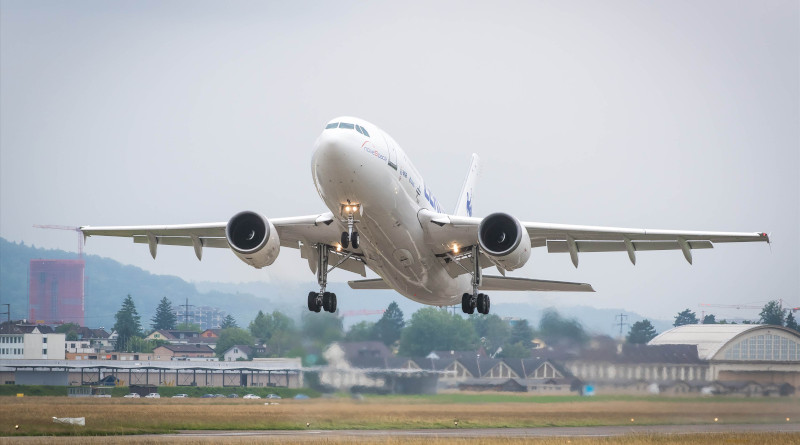A Flight To Weightlessness From Zurich-Dübendorf
The fourth parabolic flight organized by the UZH Space Hub takes off Thursday from Dübendorf airfield. A reorganization taking into account Corona safety measures has made this possible. On board is an experiment that could help to attenuate massive inflammatory overreactions of the immune system that happen in severe cases of Covid-19.
Safety measures imposed in the context of the SARS-CoV-2 pandemic have severely restricted most research activities, as well as business and social lives. But despite the ongoing situation, the Swiss Skylab Foundation and the Space Hub of the University of Zurich were able to reorganize the planned parabolic flight campaign and implement the required safety concept. The zero-gravity research flight will take off today, 11 June, from the former military airfield in Dübendorf – under full Corona protective measures.
The Airbus A310 will be carrying eight experiments from the fields of medicine, astrophysics and geology, including several from UZH as well as one each from the universities of Bern and Basel, ETH Zurich and the Eurac Research Institute (Italy). One experiment is the fruit of research collaboration between the University of Zurich and NASA, with the involvement of the University of Wisconsin. The campaign is partially funded by the Swiss Space Office of the State Secretariat for Education, Research and Innovation.
Suppressed immune response to combat severe cases of Covid-19
The experiments that Oliver Ullrich, professor of anatomy at UZH and director of the UZH Space Hub, and his research group leader Cora Thiel are conducting includes one with Covid-19 as its focus. “In severe and sometimes fatal cases of Covid-19, it seems that the immune system has induced a massive and dangerous inflammatory reaction overreaction, which does not occur in mild cases,” explains Thiel.
It is known from space travel medicine space medicine that immune system activation overreactions are is attenuated in zero-gravity conditions. From their previous research, Ullrich and Thiel know about possible molecular ways that this “dampened down” but still reactive immune status can be activated. During the parabolic flight, they will try to replicate this immune status seen in weightlessness in human cell cultures through various medications that are already approved for use. Deep Using molecular analysis markers they will test whether the effects achieved with medication or in weightlessness are identical. If the results they obtain are positive, it will be possible to begin conducting initial clinical trials with the aim of reducing the rate of severe and fatal cases of Covid-19. “That would enable ‘herd immunity’ to be reached with fewer risks,” says Ullrich of the new approach.
30 experiments to date in zero gravity
The current campaign brings the total number of zero-gravity experiments on the research flights organized by Ullrich to 30.
“Research in weightlessness can explain processes and make things visible that on earth are hidden by gravity, as well as helping to investigate new materials and production processes,” says Ullrich, whose background is in medicine and biochemistry. “In the field of medicine, it has brought new insights, new treatment methods and new perspectives for tissue regeneration and replacement.”
Swiss parabolic flights have high added value
It’s thanks to Ullrich’s parabolic flights that scientists from Switzerland have been able to acquire research funding at a European level or conduct their research projects on the International Space Station.
“This means the Swiss parabolic flights have high added value and boost the competitiveness of research and technology from Switzerland,” says Ullrich.
With the Swiss Parabolic Flight Program, science and innovation sectors in Switzerland gain easy access to a zero-gravity research environment. The program has been made possible through the Swiss Air Force permitting use of the military airfield at Dübendorf for the take-off and landing of the Airbus 310 Zero-G. The zero-gravity research flights are run by Novespace, a subsidiary of the French space agency CNES, which is the owner and operator of the A310 ZERO-G.
Unique situation in Europe
Peter Bodmer, member of the Board of the University and president of the Innovation Park Zurich, is firmly convinced of the potential in Dübendorf: “The Innovation Park Zurich offers a unique opportunity: access to an airfield that enables research and test flights, making the park on the Dübendorf airfield site suitable for all innovative projects in aviation and space flighttravel.”
This opinion is shared by Michael Schaepman, Vice President Research at UZH: “With an airfieldstrip on our doorstep we have a unique situation within Europe, and as today’s parabolic flight shows, UZH and the Space Hub are reliable partners in the aerospace research and development area of aviation and space travel even in challenging times.”

